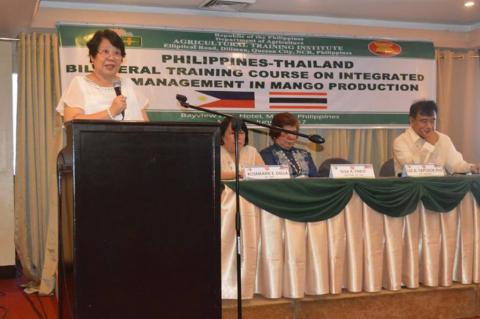Dr. Luz Taposok promotes the practice of IPM during the Philippines-Thailand Bilateral Training Course at Bayview Park Hotel in Manila.
MANILA – In the context of food security and affordability, the application of good agricultural practices (GAP) and integrated pest management (IPM) are two farming techniques widely promoted by the Agricultural Training Institute (ATI).
ATI OIC Director Luz A. Taposok, in her opening remarks for the recently held Philippines – Thailand Bilateral Training Course on Integrated Pest Management (IPM) in Mango Production, urged the agricultural practitioners to understand the breadth and depth of the concept of IPM.
According to her, the country continuously takes measures in improving the fruit industry to efficiently meet the product demand and increasing population. This includes the process of IPM to combat substantial losses in mango and the fruit production in general.
“Mangoes, like all other fruit crops, are definitely prone to insects and diseases. Thus, growers should employ proper pest management program to produce quality mangoes. Through IPM, pest and chemical contamination problems can be minimized,” she expressed.
The OIC-Director noted that consistent to the bilateral agreement between the Philippines and Thailand government, the training will enable the participants to expand their knowledge and appreciation for the worldwide adoption of IPM for mango.
She stated, “This will help you learn the good agricultural practices we apply in the Philippines and how to cope with the current trends in the export market.”
Furthermore, she noted that the training will enhance their capabilities in the cultural management practices such as pruning, cultivation, sanitation, and proper nutrition to enhance vigor and fruit bagging. She added that there would be an exchange of knowledge on the control measures in the mango industry in line with the concepts and principles of IPM.
To encourage more partnership projects with Thailand, Dr. Taposok called on the Thai participants to work together as Asian nations.
“I am confident that at the end of this training, we can bring the mango industry in greater heights. As we will be equipped with the technical knowledge and skills on IPM, we no longer need to worry about pests and contamination. We can learn and practice the best way to deal with losses.”
“You may have different races. But we are here to work together and advance together,” Dr. Taposok said to all the participants.
The Philippines – Thailand Bilateral Training Course on Integrated Pest Management (IPM) in Mango Production was held last May 28-June 8, 2017 at Bayview Park Hotel in Manila.

